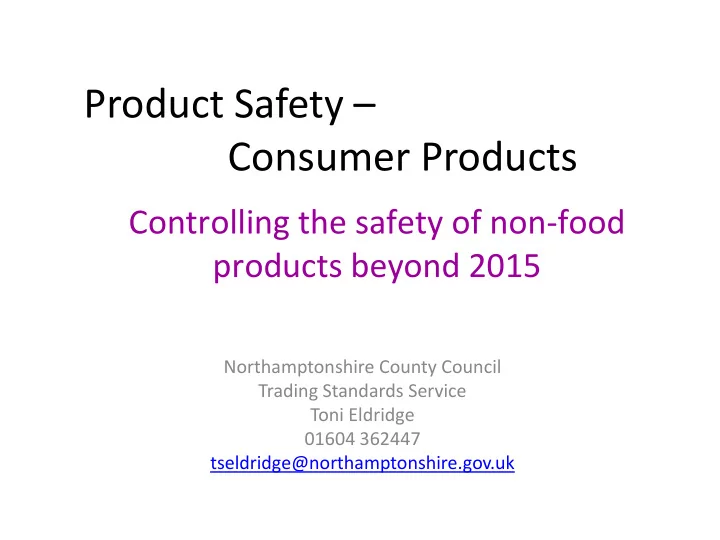

Product Safety – Consumer Products Controlling the safety of non-food products beyond 2015 Northamptonshire County Council Trading Standards Service Toni Eldridge 01604 362447 tseldridge@northamptonshire.gov.uk
Issues – unsafe liquidated stock - found in local bargain store 1. How do we trace where all the product has gone? 2. How to investigate when no safety certificates are available? 3. Who is responsible for the recall – is it left to Local Authorities?
Issues – unsafe import via Eastern European lorry delivered to travellers who then used aggressive selling techniques door to door 1. No name or address of the manufacturer – it’s not Germany 2. Travellers do what they do best – travel (no continuity with police) 3. Product disappears from the area prior to testing
Issues – unsafe import at fulfilment house, importer in China 1. Difficult to trace fulfilment house – no details as not importer – importer moves to another area 2. Returns to fulfilment house burned out, but product still being dispatched – oblivious to safety issues 3. Fulfilment house not responsible for product’s safety
Issues – Importer voluntary recall not taken seriously 1. Initial difficulty in establishing contact within importer company 2. When established and notified of unsafe RCD – recall issued 3. One retailer did not take seriously and product fitted in consumer homes by various electricians 4. was not returned to store until Trading Standards contacted them
Where are we now? Current Position • PSFG is the current group co-ordinating enforcement issues throughout the UK. – It meets around 3 times per year at BIS – includes representatives from both BIS and regional Trading Standards specialists. Funded to attend by their LA. – It has no direct influence on market surveillance or funding, which is still decided by LA’s and influenced by NTS • NTS is the group that provides leadership (connecting with ACTSO), influence, support and resources to help combat consumer and business detriment and co-ordinate regional enforcement, including an e-crime unit. Intelligence led tasking and BIS funded in part (not officer’s time) • TSI -Trading Standards Institute – Business companion, Consumer Companion and CTSI.
Where are we now? • One major flaw in the current system is not having an integrated intelligence system , but instead officers are expected to consult RAPEX, ICSMS, Memex and IDB as well as information from other bodies such as CitA and ESF, fire brigade(?) with no time left to effectively input into these systems, making them less effective than they may be • Not all these intelligence systems are accessible to the public and not all of those that are accessible are well known or very user friendly. Businesses come to Trading Standards for advice not direct to TSI – Primary Authority advice via TSO’s • Scarcity of resources means that not all LA’s are able to support market surveillance projects despite funding being made available due to lack of [dedicated safety] officers.
Need to improve resources for Market Surveillance Authorities, • Need officer’s on the ground for enforcement activities - Market surveillance activities, inc inspections, test purchases, take further action via suspension, or recalls, respond to complaints. • Sufficient officers suitably trained and experienced to offer advice - under the Primary Authority Partnership scheme, or Home Authority schemes (where they may still exist), to avoid the commission of offences • Enable sufficient time to contribute to intelligence led activities - including update intelligence databases, and ‘mapping’ and sharing of information from other organisations involved in recall processes to prevent death, injury or damage
Funding – Challenges and opportunities • Austerity measures are likely to mean a further cuts (~40%) to LA funds, and expected to hit non-ring fenced services such as Trading Standards....brain drain will also affect TSI? • There is a growing demand for the use of fulfilment houses (at least 9 in Northamptonshire alone) as a means of distribution for 3rd Country imports, but where limited or no responsibility is accepted for safety, leaving the burden on local authorities to continuously inspect, test and suspend. This cannot effectively be achieved on LA budgets alone. • PA partnerships are working well. Perhaps businesses would welcome an alternative to LA funding for the provision of a centre of excellence and co-ordinated access to information to promote product safety and improve recalls
Central co-ordination and leadership – Have a dedicated, well trained and experienced product safety team – Properly funded and fit for purpose – Co-ordinate national and regional market surveillance projects and recalls where necessary instead of relying on underfunded LA’s – Collate and consolidate intelligence to more quickly determine the best use of funding and tasking market surveillance projects
Empowering businesses and consumers • To have a website that consumers can trust to report potentially unsafe products that may not otherwise report to CitA • Improve access of information to consumers as to how they can access affordable safe goods through informed choices • Provide businesses with a better co-ordinated, more reliable and detailed guidance on safety and recall • to assist the co-ordination of all measures, especially recalls that can be utilised to prevent injury or accident (education, press releases, recall notices, reducing access to unsafe goods)
Traceability Need ideas to:- Use or develop technology To ensure traceability ...from import to the consumer.... A system that consumers can trust ...that also captures goods that are.... • Bought by consumers from 3 rd Country sellers • Sold by and Fitted by professionals where all in the supply chain take recall responsibilities seriously • ...or sold door to door or via other dubious sales outlets
Recommend
More recommend